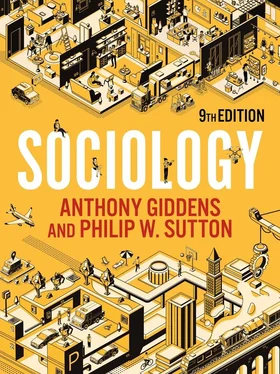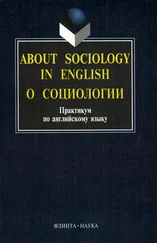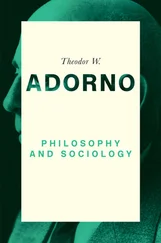There are several other interactive elements throughout the book. Thinking critically boxes mark ‘stopping off’ points, where readers can reflect and think through the significance of what they have learned. We strongly recommend working through these boxes to get the most from the book. Global society boxes encourage students to think globally about even the most apparently local or domestic issues. Boxes labelled Using your sociological imagination often contain unusual or arresting material designed to illustrate or expand on themes found in the chapter. The Glossary continues to expand as sociologists devise new concepts that pass into common currency. All glossary terms are highlighted in bold within chapters for easy reference.
The ‘sociological workshops’ at the end of each chapter have proved useful for teaching and learning and have been updated again this time. The Chapter review asks questions based on chapter material, and it is a good idea to work through these immediately after reading, though they may also be the basis for revision at a later date. Research in practice concentrates on research methods and their application in real-world studies. Here, we point readers to a piece of contemporary research, usually a journal article, and ask them to track it down, read it and make notes as they do so. A series of questions then allows readers to think about the different types of research and methods, what they are used for and how successful they have been. An understanding of research methods is essential for the practice of ‘doing’ sociology.
Thinking it through exercises select a theoretical paper, an online discussion or a newspaper article which raises issues of theory and explanation. Part of the activity is to make sure readers understand the concepts used and the meaning of the paper. A fair number of students tell us they find ‘theory’ difficult to grasp, mainly because it seems abstract and distant from their own lives. We have therefore selected theoretical pieces which bear directly on real events to bridge the apparent divide between theory and daily life.
Society in the arts takes us outside academic social science, into the arts and humanities. In this section we suggest films, TV programmes or plays, novels, artworks or sculptures, music and exhibitions. All of our recommendations are closely linked to the chapter material, and we ask readers to consider how they add to their knowledge of society. What is special about the arts? How is contemporary social life represented in the arts? Do the arts tell us something different about the world that the social sciences never could? We encourage readers to consider such questions carefully in the exercises here.
Finally, the Further readings have been updated and briefly annotated, so readers can make a more informed choice about what they choose to read. Similarly, Internet links have been checked and updated, so readers can explore some of the material now available online. The book also has its own website – www.politybooks.com/giddens9– which has resources for further research and in support of teaching and learning.

1 An introduction to sociology
2 The sociological imagination
3 Studying people and societies
4 The development of sociological thinking
5 Theories and theoretical perspectives
6 Founders of sociology
7 Three theoretical traditions
8 Levels of analysis: microsociology and macrosociology
9 The uses of sociology
10 Public and professional sociology
11 Summary
12 Chapter review
13 Research in practice
14 Thinking it through
15 Society in the arts
16 Further reading
17 Internet links

As the Covid-19 pandemic spread around the world in 2020, many national governments closed their borders or imposed entry restrictions. This had a dramatic effect on global aviation. A majority of the world’s aircraft were grounded and many of the best-known airlines effectively closed down. Flying is one of the more visible examples of globalization and the fabulous opportunities it offers, but the aviation industry also helped to spread the virus and its health risks rapidly across the globe. This example illustrates something of the character of today’s high-opportunity, high-risk world.
Today’s social world offers exciting opportunities for travel, work and leisure that heighten perceptions of individual freedom and choice. Yet, at the same time, many people have anxieties and concerns about the risks inherent in our modern way of life. With widespread use of the internet and social media, communicating and maintaining contact across continents is more immediate and routine than ever before, but there are also violent crime, global terrorism, national conflicts and wars, along with persistent economic and social inequalities. The modern world has many opportunities and possibilities but it is also fraught with high-consequence risks such as global pandemics, rising air pollution, climate change, and the threat posed by nuclear and chemical weapons. We live in ‘high-risk, high reward’ societies which appear to fluctuate wildly between extremes without any overall authority or control.
Most people within the relatively rich nations of the Global North are materially better off than ever before, but in other parts of the world, notably the Global South, many millions live in poverty where children die for the lack of fundamental necessities such as nutritious food, safe water and basic healthcare. How can this be, when humanity as a whole has the capability to control its own destiny to an extent that would have been unimaginable to previous generations? How did this world come about? Why is the human world riven with huge inequalities of wealth and income? Where are today’s societies heading in the future? These large questions are among the central concerns of sociology, a field of study that has a fundamental role to play in modern life.
Sociology can be simply defined as the scientific study of social groups, whole societies and the human world as such. The scope of sociology is extremely broad, ranging from the analysis of passing encounters between individuals in the street to changes in family life, new forms of personal and social identity, and relationships between nation-states. Most of us see the world in terms of the familiar features of our own lives – our families, friendships and working lives, for example. Sociology insists that we take a broader and longer view in order to understand why we act in the ways we do. It teaches us that much of what appears to us as natural, inevitable, good and true may not be so, and that things we take for granted are shaped by historical events and social processes. Understanding the quite subtle but complex and profound ways in which our individual lives reflect the contexts of our social experience is fundamental to the sociologist’s way of seeing.
An introduction to sociology
This chapter is the first of a block of three which, taken together, provide a broad introduction to the discipline of sociology: what it is, how it developed over time, how sociologists go about their work, and what kinds of explanations they use. It provides a brief introduction to what sociology is, how and why it came into existence and what it is used for. Chapter 2then looks at the practice of sociology: how sociologists actually study their subject. It describes the questions they ask, the wide range of research methods they use to address those questions, and how they evaluate their findings. It also tackles the thorny issue of whether sociology can or should be considered ‘scientific’.
Читать дальше














